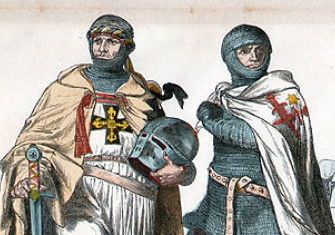The Livonian Knights Battle on the Baltic
On 16 February 1270, the Livonian Knights were defeated at the Battle of Karuse.

It wasn’t exactly a motto, but they liked it nonetheless. ‘The sword is our Pope’, the Livonian Knights said, ‘and it is a Pope that is never far from you.’
Formerly known as the Sword Brothers, the Livonian Knights were a monastic military order akin to the Knights Templar. They were founded around 1202 to bring Christianity to the shores of the Baltic – a vast arc of still-pagan land sweeping east and north from the River Elbe in Saxony
The Sword Brothers had a mixed reputation: they were merely ‘rich merchants banned from Saxony for their crimes, who expected to live on their own without law or king’, one chronicle said. They struggled for a long time with the deep snow and ice of the Baltic winter; the conditions seemed to often overwhelm them.
On 16 February 1270, the feast of St Julian, Otto von Lutterberg, their Master, led an army out on to the frozen sea between the mainland and the island of Muhu. A Lithuanian army had ravaged the prosperous island of Saaremaa and now wanted to return. Otto thought he had them trapped.
A chronicler tells us that, seeing the Christian army, the Lithuanians drew their sleds into a defensive wall. But the Livonian Knights charged before their whole force was ready. Their front line smashed against the pagan’s sleds. ‘The heathens rejoiced and stabbed their horses to death’, the chronicler says. ‘There was a wild hacking and hewing on both sides, Christian and heathen, and the blood of men from both armies spilled onto the ice.’ Most of the knights’ horses were cut down, and the men fought on on foot. The noise of battle, the ice acting as a vast sounding board, must have been terrible indeed.
The Lithuanians lost 1,600 men and the Christians 600. But it was the Christian army that retreated, leaving the ice – strewn with the dead, slippery with blood – to the pagans.
It would not be until 1386 that the Grand Duchy of Lithuania, Europe’s last pagan redoubt and its largest state, submitted to Christ – and that was only to add Poland to its territories.






